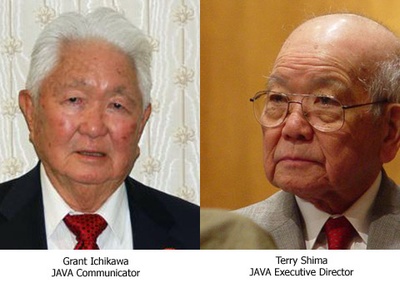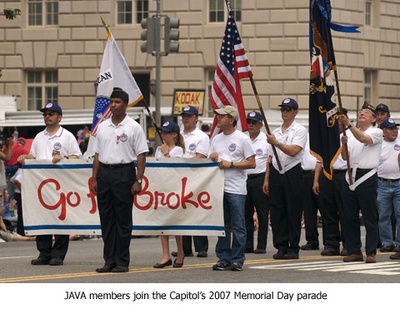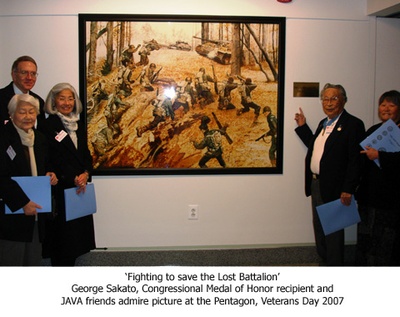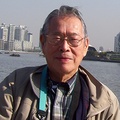At a time when many U.S. veterans organizations have declining membership, are moribund, or have voted themselves out of existence, the Japanese American Veterans Association of Washington, DC, has shown real growth. Prior to 2005, JAVA, as the group is popularly known, had 216 members. Now, it boasts 520 members, well over 100 percent in just three years! Of these, 79 were transfers from defunct vet organizations. New membership averaged out to more than 45 each of the past three years.
Given that the Association was founded by World War II veterans, to learn -- more than 60 years after the end of that war – that it is growing in head count may seem almost inexplicable. As the organization is based in the Washington, D.C. area, certainly not a mecca for those of Japanese ancestry, the growth can be attributed, in part, to JAVA’s deliberate outreach beyond the nation’s beltway.
But, that is not the real explanation!
Vet organizations do not survive. They gradually fade away. But, JAVA’s good health is due to the efforts of two World War II veterans, both in their 80-somethings. Terry Shima and Grant Ichikawa have dedicated their vet life to helping JAVA help fellow vets, principally Japanese Americans, but not entirely, for the Association itself now has a great cross-cultural mix.
The day-to-day management of this totally volunteer-run organization is Terry’s responsibility. A former member of the famed 442nd RCT, he works from his retirement condo in suburban Maryland. As Executive Director of JAVA, he serves under the general direction of JAVA’s current president, Bob Nakamoto. The latter is the chief executive of a private consulting firm that does work for the Pentagon.
Don’t mistake Terry’s self-effacing demeanor and style. He is a dynamo of energy and knows how to get things done, as his accomplishments well show.
While organizational management is ably handled by Terry, the remarkable “extension” that JAVA has achieved is due in large part to Grant Ichikawa. He provides – with a sure hand -- the e-mail linkage that JAVA has with its membership. An indefatigable communicator and facilitator, Grant’s well-known “Round Robin” e-mail ties in the membership twice-weekly to what is going on in the JA vet community. His contact is truly world-wide. Sadly, one of the features of Grant’s “R/R” has been the publication of Nikkei vet obituaries. That listing has been unending.
In addition, both Terry and Grant share principal responsibility for JAVA’s quarterly membership luncheons. These get-togethers have provided an effective forum for maintaining contact with Federal government officials, Pentagon brass, and with Asian Pacific American military notables in the greater community. That said, the luncheons play an important part in maintaining locally the social camaraderie of the association – among vets, spouses, widows, and, in fact, all those JA’s and friends who are vet-connected from World War II until now.
Another critical linkage the JAVA has with its members is its quarterly newsletter, the JAVA Advocate. Now being edited (through the marvels of the computer) by Maj. Kay Wakatake from her posting in Germany, the Advocate has become a thoroughly professional publication with great color and photos. And the caliber of the writing in it matches its appearance.
An even more long-running achievement has been JAVA’s great website: www.javadc.org. The webmaster, David Buto, a former West Pointer, and a true professional when its comes to incorporating computer know-how into organizational practice, provides a much-accessed information service. Dave arranges to find answers to inquiries received from high school and college students interested in JA military history, the World War II internment, etc. He also assists individuals seeking information about military comrades and old JA friends with whom they have lost touch. And for those who want to see what the Advocate has to say, it’s available electronically on this website, as well.
So, veterans organizations don’t have to fade away. With barely a budget to speak of, JAVA, with people like Terry, Grant, Kay and Dave engaged together in a labor of love, has managed to persevere marvelously...and miraculously. And in doing so, JAVA serves as a constant beacon, focused on a Japanese American vet community that has contributed to our nation’s greatness -- in war and in peace.
[NOTE: The organization profiled above is not the National Japanese American Veterans Council, which is affiliated with Discover Nikkei. The Council has focused on developing projects that provide a legacy perspective to the contributions and experiences of Japanese American veterans. The work of the NJAVC will be described in a future Nikkei Album posting.]
© 2008 Calvin Ninomiya






